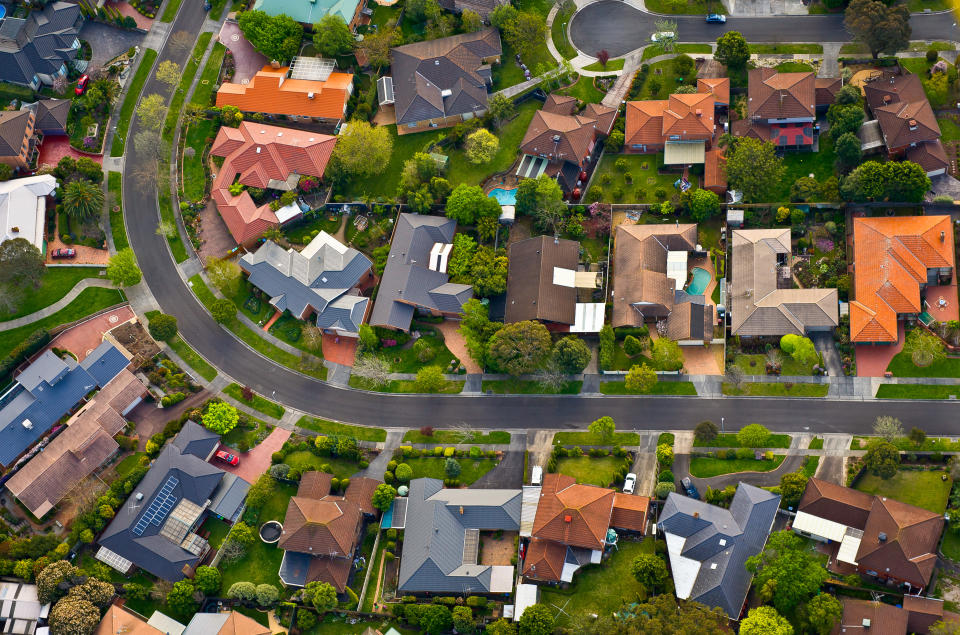5 property market myths busted

Australia’s median property value fell 0.6 per cent in July and is tipped to fall anywhere between a few more percentage points and a whopping 32 per cent.
But according to Aussie Home Loans chief customer officer David Smith, that doesn’t mean prospective buyers should hold off on their purchasing decisions.
“We have seen a drop in house prices recently, but the price falls are smaller than first predicted during the height of the pandemic. So, if you were ready to make your move and aimed to reach your home goal this year, there is no reason why this should stop you if it’s the right time for you,” Smith said.
He said finding a home is a personal journey, so it’s important to seek help navigating the different market conditions. Generally speaking, however, those waiting to purchase due to hopes of significantly cheaper house prices were labouring under a “myth”.
Smith busted four other property market myths:
Aussies should wait until interest rates drop further before buying
“When it comes to interest rates, predictions vary. Some Australians believe the 0.25 per cent interest rate is here to stay and there is no need to take advantage of it just yet, asking themselves, why now when I can wait? While others are waiting for it to drop to a zero rate, and there is even some speculation about a negative interest rate,” Smith said.
Practically speaking, it’s impossible to know how interest rates will change, he added. The Reserve Bank of Australia itself has flagged 0.25 per cent as its interest rate floor, and said it will be some years before rates increase. And independent economist Stephen Koukoulas has also told Australians to prepare for years of record low rates.
Smith said now is a good time to lock in a low interest rate, and can save thousands of dollars down the line.
Refinancing is too hard and risky
With interest rates at record lows, Smith said refinancing “shouldn’t be a scary word”.
“By refinancing you can benefit from a variety of things as it enables you to release equity from your property. Another benefit could be having extra cash on standby, as you could take advantage of the lower interest rates to lower your monthly repayments and save money in the long-term or use it to increase your cashflow by taking advantage of the cashback offers that some lenders are offering their customers.”
And if your job is secure, refinancing could even help you pay off your loan faster by making additional repayments and lowering interest.
But if borrowers are concerned about how the pandemic is impacting their loan, they should consider speaking to an expert like a broker before beginning the refinancing process.
It’s harder to get a loan during Covid-19
Most (70 per cent) of Australians believe job security will prove a challenge in achieving their property goals, Aussie research revealed. And less than half believe 2020 is a good year to buy property, down from 76 per cent in January.
Overall, six in 10 believe their goals are harder to achieve due to the pandemic.
“There are a lot of questions being asked of the experts at the moment,” Smith said.
“One thing that’s certain, is that it takes time for lenders to assess a loan application so getting pre-approval to find out whether you are eligible and how much you can borrow is a good way to understand where you stand.”
That doesn’t necessarily mean it will be more difficult, but it could well take longer.
CUA home loan specialist Joel Dooner agreed.
“One of the big changes has been around qualifying for a loan. In a time where there’s more uncertainty about the economy and employment in some industries, many lenders have needed to put some additional checks in place to make sure borrowers can afford the ongoing commitment of a loan,” Dooner said.
There are also several incentives on the market designed to make it easier for some borrowers - especially first-home buyers. He said even if personal circumstances have changed, working with an expert can make it easier to access the market.
You need a huge amount for a deposit
According to CoreLogic’s 2019 Perceptions of Housing Affordability report, Australians list saving the deposit as the biggest barrier to entering the market. At the time of the release, the average Australian took 8.7 years to save 20 per cent deposit based on the assumption that that household was saving 15 per cent of their income.
“For some Australians, it can be intimidating and deflating to think about the size of a deposit needed to purchase a home which could be holding them back from taking steps to understand how much they really need to save to hit their home goals,” Smith said.
“There are many different variables in buying a home regardless of whether you are a first home buyer, choosing to move or perhaps invest. If you are fortunate enough to have secure financial circumstances or steady employment during this time, and don’t know if this is enough to achieve a property goal, seeking guidance to know what your options are will give you an idea on what it will take.”
For first-home buyers, it could be easier than ever to get a deposit together with the First Home Loan Deposit Scheme allowing them to take out a loan with a 5 per cent deposit.
St George Bank is also offering $1 lenders’ mortgage insurance for eligible first home buyers. That means those buyers can apply for a loan with a 15 per cent deposit without being stung with thousands in lenders’ mortgage insurance.
Make your money work with Yahoo Finance’s daily newsletter. Sign up here and stay on top of the latest money, news and tech news.
Follow Yahoo Finance Australia on Facebook, Twitter, Instagram and LinkedIn.

 Yahoo Finance
Yahoo Finance 
